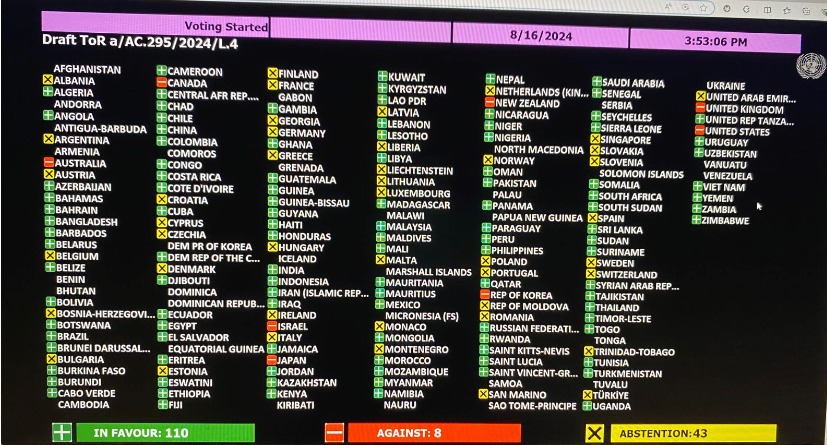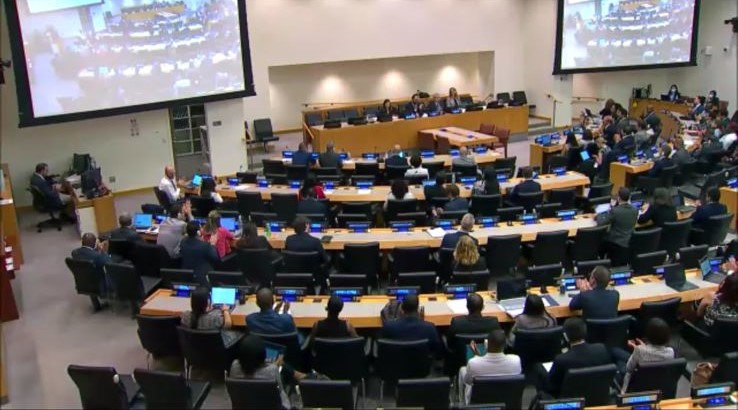NOVA Tax Lab UN Framework Convention On Internacional Tax Cooperation Weekly Report
16 August 2024
The Chair’s final Proposal for the Draft ToR (A/AC.295/2024/L.4), dated 15 August 2024, only presented significant changes in the protocols section in relation to the previous proposal – Draft ToR_Rev.2 (11 August 2024). However, when compared to the Zero Draft (7 June 2024), most paragraphs have suffered some sort of amendment.
As mentioned in the previous report, a consensus occurred within the Committee to include more General Assembly resolutions in the preamble. As a result, the Resolution 70/1 of 25 September 2015, on “Transforming our world: the 2030 Agenda for Sustainable Development”, has been added to the preamble. Other suggested resolutions, however, such as the A/RES/217(III) (Universal Declaration of Human Rights), were not included.
Regarding the objectives section (paragraph 7), besides the chapeau’s subtle but accurate replacement of the word “purposes” for “objectives”, sub-paragraph A now “establishes” a “fully inclusive and effective international tax cooperation”, instead of just setting out its principles. Despite the ‘Global North’s’ struggle to change the wording of Sub-paragraph B, the latter continues to “establish a system of governance for international tax cooperation”, only now without any reference to the Member States’ tax sovereignty, which became covered in the principles section. As for Sub-paragraph C, while the Zero Draft made explicit reference to “while addressing tax-related illicit financial flows and other challenges to strengthening domestic resource mobilisation”, the final draft opts to keep a broader language “while addressing challenges to strengthening domestic resource mobilisation”, hiding the reference to ‘illicit financial flows’, terminology that was much questioned by some of the countries during the negotiations, as reported in the previous weeks.
The changes introduced to the principles section are manifold. Firstly, paragraph 8 now explicitly mentions that the principles guide the framework convention in achieving its objectives. Similarly, the chapeau of paragraph 9 now also references the framework convention’s objectives rather than just mentioning a fully inclusive and effective international tax cooperation system. This amendment ensures that the principles of the framework convention cover all of its objectives and not only paragraph 7 (a), as the interpretations of the Zero Draft would allow. Regarding the several sub-paragraphs within paragraph 9, the main changes are as follows:
Sub-paragraph a – Mention “developing countries”, ensuring that its needs are a substantial consideration without diluting the reference to “countries in special situations” – a battle fought by Jamaica, Barbados, and other small island countries facing significant environmental and climate challenges.
Sub-paragraph b – Tax sovereignty of each Member State is protected, but its removal of the last segment does “(…) not undermine the effectiveness of the tax base or system of other Member States”, necessarily considering that any natural tax competition between Member States undermines others – input provided by the USA.
Sub-paragraph c – Human rights reference has been broadened to human right law instead of just limiting it to the previous respect for “other fundamental rights”. However, the scope was restricted to the “the pursuit of international tax cooperation”, thus a major downgrade to what most countries, that have been advocating for a reference of the human rights within the principles section, initially defended and envisaged in the previous draft version – “be fully aligned with international human rights law and States’ existing commitments under human rights conventions to respect, protect and fulfil all human rights for all people in all countries.”
Regarding the commitment section, the EU block pushed for a more general terminology in both the chapeau of paragraph 10 and its sub-paragraphs, but was unsuccessful. It thus seems that the current chapeau is based on India’s proposal. Sub-paragraph C of the commitments “international tax cooperation approaches that will contribute to the achievement of sustainable development in its three dimensions, economic, social and environmental, in a balanced and integrated manner” was the target of multiple discussions. Whilst the African group and the Middle Eastern delegations aimed for its removal, South American countries and small islands, supported by the EU block, fought to keep the sub-paragraph in the ToR. The current wording appears to be a compromise between the two, built on the Pakistan’s proposal to replace the wording of “environment” for “sustainable development”, tweaked by Barbados’s contribution to mention the environment as one of the sustainable development goals/dimensions.
Sub-paragraph D has been added with some language to broaden the scope of the administrative assistance – as provided by the representative of the delegation of Nigeria on behalf of the African group. What previously was restricted to transparency and exchange of information now includes effective administrative assistance on all tax matters, including, but not restricted to, transparency and exchange of information. Additionally, the African group secured another win with the new commitment expressed in sub-paragraph E, “addressing tax-related illicit financial flows, tax avoidance, tax evasion, and harmful tax practices”.
As already reported in previous weekly reports, one of the most challenging topics to agree on was on the protocols: should there be protocols in advance? If so, how many and on what subjects? Will protocols have binding effects? And when should these be negotiated, together with the framework convention or later? It seems, however, that despite the lack of consensus in the last formal and informal sessions, at least some of the Member States, in the informal discussions, agreed to take on the commitment expressed in the final draft. Firstly, paragraph 14 stated that “Protocols are separate legally binding instruments, under the framework convention, to implement or elaborate the framework convention. Each parties to the framework convention should have the option whether or not to become party to a protocol on any substantive tax issues, either at the time they become party to the framework convention or later”, as a means of addressing concerns voiced loudly by developed countries. Secondly, it was agreed in the ToR that two early protocols will be negotiated at the same time as the framework convention – a great victory for developing countries, hungry for some solutions.
Regarding the issues that the first protocols should cover, consensus was far from being reached, whilst developed countries insisted on a prior analysis to determine which issues should be ordered, considering that each country has its priorities. However, developing countries were not in favour of postponing this definition. Thus, the final draft, seeking to find common ground between such antagonistic positions, limited itself in paragraph 15 to establishing the subject to be discussed in one of the early protocols. Thus, the first protocol will address the “taxation of income derived from the provision of cross-border services in an increasingly digitalised and globalised economy”. In contrast, the second “should be decided at the organisational session of the intergovernmental negotiating committee” and should be drawn considering the specific priority area portrayed in sub-paragraphs‘ a’ to ‘d’ of paragraph 16.
But whilst developing countries ‘got mostly what they wanted’ within the protocols, developed countries secured the timeline for its negotiation, which now extends until the end of 2027. In addition, as expected, the Committee maintained the wording of the former paragraph 20, now paragraph 22, which deals with considering the work of other relevant forums, such as the OECD, by the framework convention negotiating committee.
Finally, concerning the upcoming intergovernmental negotiating committee, international organizations, civil societies, and other relevant stakeholders, such as the academia, the private sector, and even taxpayers’ representatives, are encouraged to contribute to the work of the Committee. The current paragraph 21, initially missing from the Zero Draft, originally proposed by Costa Rica and later developed by Canada, mustered support from all delegations. Despite some tweaks to the language, delegations want to keep the negotiations open and inclusive to all members of the society, an important indicator.
In Friday’s afternoon meeting, the Committee voted on the proposal for the ToR, adopting the text with 110 votes in favour, 8 votes against, and 44 abstentions. As for the countries voting against the current text – CANZ, Israel, Japan, Korea, UK and USA – the general statements provided were overall aligned with two fundamental concerns: the relationship of the framework convention with the work of other relevant fora, aiming specifically synergies and focusing on gaps and inefficiencies; and consensus in decision making to achieve maximum participation.
As for the abstentions – the EU block, Norway, Switzerland, Singapore, North Macedonia, Montenegro, Ukraine, Moldova, and Georgia – besides the above issues addressed, aimed to introduce safeguards alongside taxpayers’ rights, keeping the commitments on high-level terms, as well as pushing the decision on the relevant issues to be addressed in protocols by the upcoming negotiating committee.
Despite the reservations made, the Member States reiterated their willingness to participate constructively in the forthcoming negotiations, hoping that it will be possible to achieve a truly inclusive international tax system.
By Pedro Ferrão Marinheiro and Mariana Passos Beraldo



